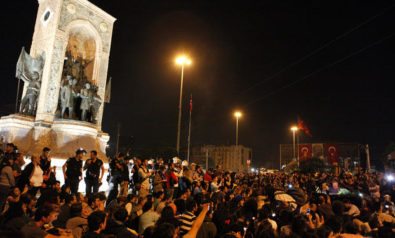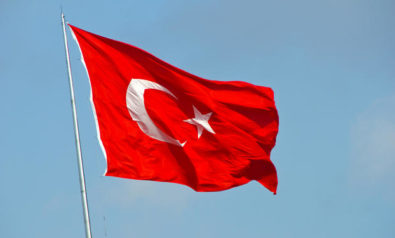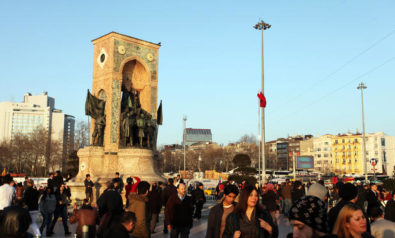Erdogan’s government has antagonized major portions of Turkish society over the last decade. This is the first of a two part series.
It all started with a sit-in protest against government plans to demolish the last green area – Gezi Park – of Taksim Square in order to build a shopping mall in the center of Istanbul. Protesters occupied the park, set up tents, sang songs, and read books until the police arrived. Police set fire to the tents and showered them with tear gas and water cannons. Following the police attack, within a few hours, the Gezi Park demonstrations spiraled into nationwide protests.
Explosion of Long-Standing Unrest
Although demonstrations began as a reaction to the construction of the 93rd shopping mall on a green area in Turkey, the breaking point was the brutal police repression. However, the demonstrations should be interpreted as an explosion as they reflect long-standing unrest. Therefore, the question is what are the reasons that pushed the Turkish people to protest?
Generally, it can be said that Prime Minister Recep Tayyip Erdogan was accused of being arrogant in both his manners and decisions. His attempt to regulate people's private lives was perceived as an authoritarian attitude. For many Turkish citizens, Erdogan is a dictator. Some authors criticize the use of the term “dictator” with the argument that he came to power through democratic and fair elections. According to them, he differs from dictators of the Middle East in that sense. However, Erdogan is still a dictator to some because he not only ignores the other half who did not vote for him, but he also does not listen to any demands, criticism, and suggestions.
Authoritarianism
Erdogan gives the impression that he wants to rule the country alone, without any interruption. His incapability to control his anger, slang expressions, bumptious manners, and his “I do what I want” attitude, have long been criticized by the Turkish people. He arrested journalists and generals, put pressure on the media, and tried to muzzle the internet. All this shows his intolerance of different ideas and fear of interruption. Turkey experienced coup d’états and military juntas in the past; though the latest coup was over 30 years ago. Even so, many Turkish people consider the Erdogan government’s oppression and censorship intolerable and unbearable compared to the military rule.
The Turkish prime minister has a strong desire to change the constitution and switch to a sui generis presidential system. He explains his idea of a “Turkish-style system” by arguing that an American type presidential system would not be enough, because “the American president cannot appoint an ambassador, cannot even decide on the sale of a helicopter.” He thinks: “Due to the restriction of his authority, Obama is so miserable.” Erdogan's insistence for acquiring more power has irritated many Turkish people, and he is increasingly referred to as a “sultan.” He adds: “[A] presidential system is not something alien to the Turkish society because we experienced this system before, during the Ottoman period.” Perhaps what caused many Turkish citizens despise him most have been his remarks about the separation of powers which, according to Erdogan, “stands in the way.”
Controlling Information
The government’s control of information through censorship of the media is another reason for the Turkish outcry. Protesters also targeted mainstream media by demonstrating in front of media buildings.These actions were justified as Turkish media did not even mention the events for at least three days, and when they did, they misrepresented the incidents. In the last decade, Turkey has become the biggest prison for journalists in the world.
The Turkish PM does not refrain from bawling out media owners and threatening them with punitive taxes. What Erdogan wants to control is not only the press but also television series and shows. He made a call for the Radio and Television Supreme Council to “deal with” obscene scenes, appearance of alcoholic drinks, or skimpy clothes. Following punishments of obscenity, television shows and series started to self-censor. Erdogan warned the New York Times on June 7 against publishing adverts supporting the protests. Restrictions for internet users have increased as well. Last week, the mayor of Ankara, who is from the ruling Justice and Development Party (AKP), threatened protesters in his tweets: “If we want, we can shut down internet in a second.”
Manipulation of the Judiciary
Another reason for the disquiet is the manipulation of the judiciary. The alleged coup case (known as Balyoz/Sledgehammer) is the most obvious example. Other than a serious amount of fabricated documents, a lot of evidence proved to be fake. Documents allegedly proving plans for a coup that were claimed to date back to 2003, contained digital elements from Microsoft Office 2007. Those who are accused of planning a coup are being held in prison for years. The presumption of innocence is not respected.
Furthermore, the prosecutors are not presenting real evidence. Instead, they are fabricating evidence in order to charge or at least keep the defendants in prison. Ten lawyers who tried to draw attention to the unlawful process are now facing criminal charges for attempting to influence the judicial process.
Turkish citizens did not only react to the unlawful procedures, but also to the attempt to trivialize the Turkish Armed Forces. The role of the military in Turkey’s political history, especially in the establishment of the republic and process of modernization, is perceived as cardinal in Turkish culture. Besides, it should also be noted that, although the Turkish Army is among the most respectable institutions in Turkey, the times where people supported a coup d’êtat are over. The current protests also show that no one would like to see another military government in Turkey.
Contrary to that, in 2007, millions of people who foresaw the Islamists’ oppressions, today, participated in a series of demonstrations known as “Republic Rallies.” They chanted slogans calling for the Turkish Army to intervene.
Debasement of Atatürk
Alongside the humiliation of the Turkish Army, the AKP’s debasement of Atatürk is a crucial reason for the unrest. Although the AKP’s dislike of Atatürk is well-known, Erdogan stiffened his statements about Atatürk in the last couple of years. He has not been participating in national ceremonies, which revolve around Atatürk’s victory in the Independence War, the establishment of the republic, and the opening of the Turkish parliament.
While national holidays are thus trivialized, the capture of Istanbul is celebrated ostentatiously, as it was not the victory of Atatürk but the Ottoman state – notwithstanding that Atatürk saved Istanbul in the 20th century from occupation. Moreover, Erdogan stopped participating in the national holiday ceremonies, asserting excuses often about his poor health, but then showing up in other places such as parliament on the same day. Calling Erdogan “allergic” to national holidays, a lot of Turkish citizens showed their reaction recently by celebrating those special days more enthusiastically than ever, visiting Anıtkabir (Atatürk’s mausoleum) by the thousands. Previously, the organization of national holidays was solely undertaken by state authorities. However, since the government has been distancing itself from these celebrations, events are organized by NGOs.
Atatürk Forest Farm (Atatürk Orman Çiftliği), located in Ankara, for example, has been a contentious issue for years. Erdogan cut hundreds of trees in the historical place where Atatürk ameliorated swampland and transformed the area into a forest. It is claimed that some parts of the area would be sold to the Americans to build an embassy. According to further claims, the PM would build a palace for himself. The plans are not only perceived as an outrage against Atatürk’s heritage, but also as a destruction of the environment. Apart from the Atatürk Forest Farm, plans for the third Istanbul airport, hydroelectric power plants, and the third Bosphorus bridge are all considered as moves against ecological values.
The AKP government caused and is still stepping up polarization. Turkish citizens were already divided between those who voted for the AKP, or partisans, and the others. While the “others” had problems with employment, promotion, and winning tenders, partisans climbed to the top positions and started living in enormous luxury. Erdogan divided the people and even the institutions through loyalty to the party.
Interventionism in the Middle East
The Turkish PM's eagerness to intervene in the Middle East, especially his reaction to Syrian President Bashar al-Assad, is another reason for the protests. Turkish citizens are aware that Assad has been a dictator from the beginning. Assad did not change overnight, but Erdogan did. He woke up one day and decided that his close ally and friend was a dictator, and called on the Syrian leader to leave his office immediately.
Erdogan has been rebuking Assad for not listening to the will of his people and oppressing them. But it is ironic that today the differences between the two leaders are shrinking. Many people believe that Erdogan government’s Syria policy is determined by his neo-Ottoman ambitions in the Middle East. The Turkish population is not dying to see Turkey as a regional power like the government does, but instead they want “peace at home and peace in the world,” as pronounced by Atatürk.
Erdogan transformed Turkey into a safe haven for Syrian armed and unarmed opposition groups. It has been claimed that Syrian refugees have been creating disturbances in host towns by showing up armed on the streets, harassing women, or not paying money for their puchases. Among the criticism was that opposition groups are being paid and hosted by citizens’ taxes. Opposing Erdogan’s support due to fears of conflict was justified last month.
The Turkish PM’s greed to intervene in Syria resulted in 53 deaths by a bomb blast in Reyhanli on the Syrian border. When the government put a ban on reporting about the events, suspicions went further. Redhack (a hacker group) made police records public, revealing that Turkish intelligence had made the necessary warnings, as it was already aware of what was going to happen. Following the bombings, there have been protests against the government’s involvement in Syrian politics. The most popular slogan which provided a good summary has been “Welcome to the Middle East.” Names of those who were killed in Reyhanli were hung on trees in Gezi Park where the events started.
Erdogan’s problem with the word “Turk” has also irritated a large portion of Turkish people. The Turkish PM explained his plans to remove the word “Turk” from the constitution, with the reason that “Turk” as a word refers to a race. Turks are passionate about their countries, though it is not an exclusionary and racist nationalism. They believe that – in Atatürk’s words – "Turkey's people who established the republic [are] called 'Turk.'" It would have been irrational, even ridiculous, referring to the Turks as a race with the word “Turk” in a society that is a successor of an empire of different races, ethnic origins, religions, and sects.
*[Read the final part of "Turkey: It's Not Only About a Tree, Stupid", on June 19.]
The views expressed in this article are the author's own and do not necessarily reflect Fair Observer’s editorial policy.
Image: Copyright © Shutterstock. All Rights Reserved
Support Fair Observer
We rely on your support for our independence, diversity and quality.
For more than 10 years, Fair Observer has been free, fair and independent. No billionaire owns us, no advertisers control us. We are a reader-supported nonprofit. Unlike many other publications, we keep our content free for readers regardless of where they live or whether they can afford to pay. We have no paywalls and no ads.
In the post-truth era of fake news, echo chambers and filter bubbles, we publish a plurality of perspectives from around the world. Anyone can publish with us, but everyone goes through a rigorous editorial process. So, you get fact-checked, well-reasoned content instead of noise.
We publish 2,500+ voices from 90+ countries. We also conduct education and training programs
on subjects ranging from digital media and journalism to writing and critical thinking. This
doesn’t come cheap. Servers, editors, trainers and web developers cost
money.
Please consider supporting us on a regular basis as a recurring donor or a
sustaining member.
Will you support FO’s journalism?
We rely on your support for our independence, diversity and quality.









Comment